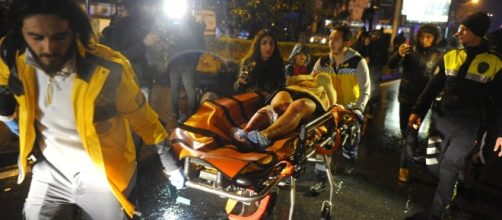The prisoners were taken out of the captured city and lined up in front of the conquering army. They had been the subject of ransom negotiations that failed and the victorious commander had decided that the prisoners would serve as a lesson for their enemy. Then, in full view of the enemy forces, his soldiers fell upon the hapless prisoners and so more than 2,700 were killed to satisfy the misplaced honour of the commander.
The language of terror
This massacre happened at Acre in the Middle East of August 20th, 1191 and the prisoners were Moslems, the victorious and impatient commander who ordered their death was King Richard the Lion Heart of England and that act is still remembered in the region.
This is the reason that the words used by the ISIS and many other terrorist groups are carefully chosen and why, beginning with Osama Bin Laden, the western and mainly Christian forces acting in the Middle East are called “Crusaders” in their announcements.
What makes the scene of the Acre Massacre so powerful is that it reminds us of the films of the prisoners executed by ISIS over the last few years. Like ISIS and making allowances for the modern technology, the massacre was a display of strength by the ruthless commander intended to cower the Moslem forces then led by Saladin. Ultimately these tactics failed and the region became a Moslem stronghold once more.
Although some in the West believe that history should remain in the past, the language and the behaviour of the terrorist groups make deliberate use of these memories to tell their faithful that they are fighting an old and evil enemy.
Unfortunately the fanatics do not need to use only examples that go back 900 years to find examples to use for their propaganda.
Colonialism and the Great Game
It would be sufficient for someone to look up a senior school history book that deals with Colonialism to understand that many of the world’s trouble spots were for long periods under the domination of European powers. Iraq, Syria, Libya and Afghanistan were pieces in the diplomatic chess game that is now called “The Great Game” and they are still important battle fields in international politics as we see every day on the television.
The difference now is that the traditional Colonial Powers of Great Britain and France have been replaced by the United States which is now the central target of the fanatic groups that wave the banner of a return of a glorious Caliphate that had been destroyed by the Christian countries.
The New Year attack in Istanbul when a gunman opened fire inTurkey was seen as part of this battle due to its collaboration with the struggle in Syria beside the Russians and the other foreign forces and thus to be considered as traitors to their Moslem brethren.
The new Great Game
What now makes the new Great Game fascinating is the repeated role of Russia in Afghanistan in the 19th Century, then as the USSR in 1979 and now in Syria. The country had always sought access to the Indian Ocean and now its intervention in the Middle East looks like finally achieving this centuries old ambition.
The battle to find solutions to the problems that led to the rise of ISIS and the waves of terrorist attacks we have seen over the last few years cannot succeed without taking into account the memories that the fanatics are trying to raise.
Worse still, in the eyes of many in the region the Western interventions have only reinforced the impression amongst part of the population that there is a core of truth to the accusations of new “Crusaders” looking to conquer their lands once more.
Any long term solution to the current situation in the Middle East will only come about when these foreign interventions are no longer required and the region will be able to govern itself without risking further intrusions on their sovereignty. Sadly this will not be easy and will take time with many more lives will be lost in the meantime.

